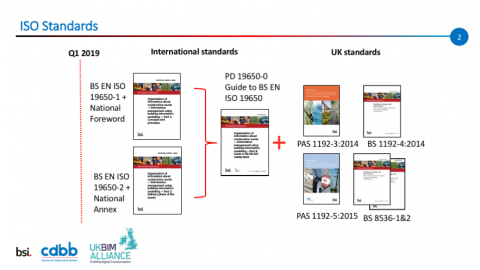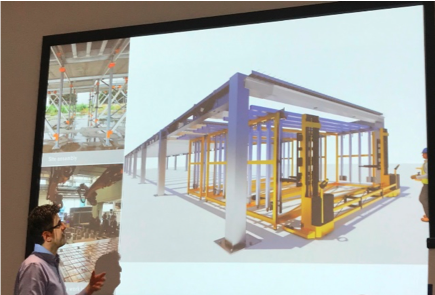
Submitted by Angela Walters on Thu, 31/01/2019 - 11:32
The first BIM4Clients [BIM4C] of 2019 workshop was held on 16th January at the Institution of Engineering and Technology with a full house of client organisations. The workshop was a collaboration between the Centre for Digital Built Britain [CDBB] and the UK BIM Alliance [UKBIMA] to provide participants with an introduction to the CDBB programme, including some of its early outputs and an opportunity to hear from peer clients on their BIM Level 2 and wider digital journeys.
David Philp of CDBB chaired the event and set the scene reminding participants that the B4C working group was originally established by the BIM Task Group as a vehicle to raise awareness of the benefits of Building Information Modelling [BIM] Level 2 and the role of the client to ensuring successful delivery. The group has now become a nexus to share experiences and help make BIM Level 2 business as usual, especially within private sector client organisations, thus ensuring both public and private BIM procurement are consistent in their approach and benefiting from the latest standards.

Nicola Pearson, CDBB Head of Change and Knowledge Transfer, introduced the CDBB, its aims and the engagement opportunities. Nicola highlighted that whilst technology is important, it is not enough to deliver change and the journey towards a digital built Britain (dbB) will be enabled by a cross disciplinary approach that takes into account policy, research, change and knowledge transfer, reflecting CDBB’s three co-ordinated programme streams.
Dr Anne Kemp, UKBIMA Chair and UK Convenor of ISO 19650 Working Group then gave an update on the UK BIM Alliance and also the transition to International BIM Standards (ISO19650).
Anne presented the UK National Annex and the key changes in the ISO including:
- A step by step lifecycle information management process
- Revised expression of BIM maturity
- Modular information management process around appointments
- Volume strategy becomes the broader concepts of federation strategy plus container breakdown structure
- New terminology

 Terry Stocks, CDBB BIM L2 Programme Lead, presented on using the PwC BIM Level 2 Benefits Measurement Methodology [BMM]. Terry explained how the BMM sets out a measurement rational and model for BIM Level 2, whilst the Application Report tests deployment of the BMM on projects that have used BIM in their delivery. As well as providing a methodology for measuring benefits, the BMM Benefits Framework is intended help to define potential BIM benefits from the project outset.
Terry Stocks, CDBB BIM L2 Programme Lead, presented on using the PwC BIM Level 2 Benefits Measurement Methodology [BMM]. Terry explained how the BMM sets out a measurement rational and model for BIM Level 2, whilst the Application Report tests deployment of the BMM on projects that have used BIM in their delivery. As well as providing a methodology for measuring benefits, the BMM Benefits Framework is intended help to define potential BIM benefits from the project outset.
The Benefits Measurement Methodology can be found at: https://www.cdbb.cam.ac.uk/news/2018JuneBIMBenefits

Jaimie Johnston, Bryden Wood
The next speaker, Jaimie Johnston, Bryden Wood discussed Platforms and Bridging the gap between construction & manufacturing. Jaimie deliberated on the need to select solutions rather than develop options, where a platform approach could enable automated design and assembly.
Further details and the document below can be found at: https://www.cdbb.cam.ac.uk/Resources/Publications

The final speaker of the day was Nigel Stroud, Heathrow Airport London (HAL) who presented on the Heathrow Airport expansion – digital requirements and strategy. Nigel illustrated how their technology architecture will support design integration across all the various programme actors and their creation of a comprehensive Asset / Employer Information Requirements to support their BIM Level 2 journey
The common theme throughout the day was the value of collaborative information management working methodologies supported by latest standards and digital technologies. The day concluded with a discussion on how the BIM4C community can develop to support members in their digital information management.
